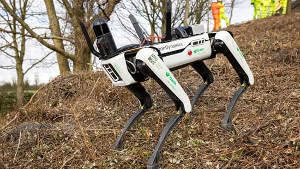Bad Driving Targeted By Police Forces And Councils Through Tech

Technology is making all the headlines again in the ongoing battle for road safety.
In the latest motoring developments, Automatic Number Plate Recognition (ANPR) and Artificial Intelligence (AI) are poised to transform the landscape of traffic enforcement, promising greater efficiency in deterring reckless driving on our roads.
This evolving innovation comes in the form of a National Highways trial, which uses state-of-the-art mobile technology equipped with AI capabilities and Boston Dynamics robot dogs (Video Link). Partnering with AECOM, the trial first started in February 2021 and will continue until March 2025.
This cutting-edge system is designed to automatically detect motorists who flout seatbelt regulations or succumb to the dangerous temptation of using their mobile phones while behind the wheel.
Ten additional police forces are joining the initiative, making it likely to expand across the UK.
Mounted on vehicles or trailers, these advanced cameras offer multiple perspectives of private and motor trade drivers and their passengers, enabling precise identification of offenders. The captured data undergoes meticulous processing before being relayed to the local authorities. Upon review, offending motorists will receive warning letters outlining the danger of their actions, a proactive measure to encourage safer driving habits.
The rationale behind this scheme is deeply rooted in the statistics: research indicates that drivers using mobile phones are four times more likely to be involved in accidents. At the same time, the absence of wearing seatbelts doubles the risk of fatality in crashes. Authorities seek to prevent these tragedies by using the available technology to directly target these actions.
Participating police forces, including Durham, Greater Manchester, and Thames Valley Police, among others, are at the forefront of this initiative. Plans are also underway to fix the technology to gantries, offering unobscured views of all lanes for enhanced surveillance.
The ramifications for offenders are substantial. Those caught without seatbelts face fines of up to £500 and penalty points. Meanwhile, mobile phone usage behind the wheel incurs fines of up to £1,000 and six penalty points on your driving licence. This will no doubt have repercussions when trying to renew your private or motor trade insurance policy with your local insurance broker.
Meanwhile, in Kent, a novel scheme spearheaded by the County Council aims to tackle a broader spectrum of driving misconduct.
They are deploying ANPR-equipped cameras across the region to target drivers driving in bus lanes and ignoring road signs. Offenders can expect to face fines of up to £70, with some leniency for first-time offenders within the initial six months of the scheme.
Sean Holden, Chairman of the Environment and Transport Cabinet Committee, emphasises that the scheme’s intent is to modify driving behaviour rather than generate revenue.

Beyond traffic management, ANPR cameras play several roles in daily life, ranging from toll collection to security surveillance. An estimated 11,000 ANPR cameras nationwide process over 50 million records daily, rubber-stamping the changes in our modern transportation infrastructure.
As ANPR networks expand, the vision of smart cities becomes even more of a reality, something motor vehicle manufacturers are watching closely as it evolves.
Real-time data insights will continue to revolutionise traffic management, optimise commuter experiences, and bolster environmental initiatives such as ‘ultra-low emission zones’ (ULEZ).
In the quest for safer roads for all users, the partnerships of the motor trade, AI, ANPR, and local authorities might just pave the way for a future where accidents are reduced.






